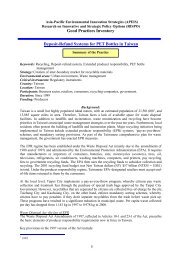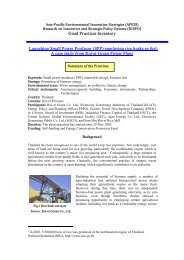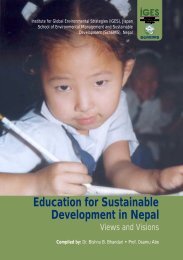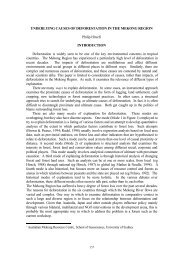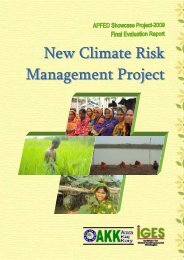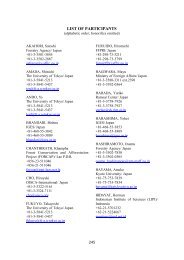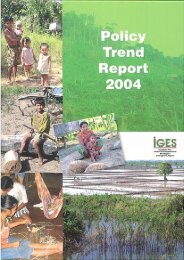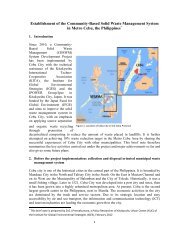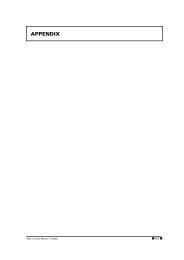- Page 1 and 2: FINAL REPORT for APN PROJECT Projec
- Page 3 and 4: CONTACT DETAILS OF COLLABORATORS Ov
- Page 5 and 6: PAGE LEFT INTENTIONALLY BLANK
- Page 7 and 8: CBA2010‐09NSY‐Okayama‐FINAL R
- Page 9 and 10: CBA2010‐09NSY‐Okayama‐FINAL R
- Page 11 and 12: CBA2010‐09NSY‐Okayama‐FINAL R
- Page 13 and 14: CBA2010‐09NSY‐Okayama‐FINAL R
- Page 15 and 16: CBA2010‐09NSY‐Okayama‐FINAL R
- Page 17 and 18: CBA2010‐09NSY‐Okayama‐FINAL R
- Page 19 and 20: CBA2010‐09NSY‐Okayama‐FINAL R
- Page 21 and 22: CBA2010‐09NSY‐Okayama‐FINAL R
- Page 23 and 24: CBA2010‐09NSY‐Okayama‐FINAL R
- Page 25 and 26: CBA2010‐09NSY‐Okayama‐FINAL R
- Page 27 and 28: CBA2010‐09NSY‐Okayama‐FINAL R
- Page 29 and 30: CBA2010‐09NSY‐Okayama‐FINAL R
- Page 31 and 32: CBA2010‐09NSY‐Okayama‐FINAL R
- Page 33 and 34: CBA2010‐09NSY‐Okayama‐FINAL R
- Page 35 and 36: CBA2010‐09NSY‐Okayama‐FINAL R
- Page 37 and 38: CBA2010‐09NSY‐Okayama‐FINAL R
- Page 39 and 40: CBA2010‐09NSY‐Okayama‐FINAL R
- Page 41 and 42: CBA2010‐09NSY‐Okayama‐FINAL R
- Page 43 and 44: CBA2010‐09NSY‐Okayama‐FINAL R
- Page 45 and 46: CBA2010‐09NSY‐Okayama‐FINAL R
- Page 47: CBA2010‐09NSY‐Okayama‐FINAL R
- Page 51 and 52: CBA2010‐09NSY‐Okayama‐FINAL R
- Page 53 and 54: CBA2010‐09NSY‐Okayama‐FINAL R
- Page 55 and 56: CBA2010‐09NSY‐Okayama‐FINAL R
- Page 57 and 58: CBA2010‐09NSY‐Okayama‐FINAL R
- Page 59 and 60: CBA2010‐09NSY‐Okayama‐FINAL R
- Page 61 and 62: CBA2010‐09NSY‐Okayama‐FINAL R
- Page 63 and 64: CBA2010‐09NSY‐Okayama‐FINAL R
- Page 65 and 66: CBA2010‐09NSY‐Okayama‐FINAL R
- Page 67 and 68: CBA2010‐09NSY‐Okayama‐FINAL R
- Page 69 and 70: CBA2010‐09NSY‐Okayama‐FINAL R
- Page 71 and 72: CBA2010‐09NSY‐Okayama‐FINAL R
- Page 73 and 74: CBA2010‐09NSY‐Okayama‐FINAL R
- Page 75 and 76: CBA2010‐09NSY‐Okayama‐FINAL R
- Page 77 and 78: CBA2010‐09NSY‐Okayama‐FINAL R
- Page 79 and 80: CBA2010‐09NSY‐Okayama‐FINAL R
- Page 81 and 82: CBA2010‐09NSY‐Okayama‐FINAL R
- Page 83 and 84: CBA2010‐09NSY‐Okayama‐FINAL R
- Page 85 and 86: CBA2010‐09NSY‐Okayama‐FINAL R
- Page 87 and 88: CBA2010‐09NSY‐Okayama‐FINAL R
- Page 89 and 90: CBA2010‐09NSY‐Okayama‐FINAL R
- Page 91 and 92: CBA2010‐09NSY‐Okayama‐FINAL R
- Page 93 and 94: CBA2010‐09NSY‐Okayama‐FINAL R
- Page 95 and 96: CBA2010‐09NSY‐Okayama‐FINAL R
- Page 97 and 98: CBA2010‐09NSY‐Okayama‐FINAL R
- Page 99 and 100:
CBA2010‐09NSY‐Okayama‐FINAL R
- Page 101 and 102:
CBA2010‐09NSY‐Okayama‐FINAL R
- Page 103 and 104:
CBA2010‐09NSY‐Okayama‐FINAL R
- Page 105 and 106:
CBA2010‐09NSY‐Okayama‐FINAL R
- Page 107 and 108:
CBA2010‐09NSY‐Okayama‐FINAL R
- Page 109 and 110:
CBA2010‐09NSY‐Okayama‐FINAL R
- Page 111 and 112:
CBA2010‐09NSY‐Okayama‐FINAL R
- Page 113 and 114:
CBA2010‐09NSY‐Okayama‐FINAL R
- Page 115 and 116:
CBA2010‐09NSY‐Okayama‐FINAL R
- Page 117 and 118:
CBA2010‐09NSY‐Okayama‐FINAL R
- Page 119 and 120:
CBA2010‐09NSY‐Okayama‐FINAL R
- Page 121 and 122:
CBA2010‐09NSY‐Okayama‐FINAL R
- Page 123 and 124:
CBA2010‐09NSY‐Okayama‐FINAL R
- Page 125 and 126:
CBA2010‐09NSY‐Okayama‐FINAL R
- Page 127 and 128:
CBA2010‐09NSY‐Okayama‐FINAL R
- Page 129 and 130:
CBA2010‐09NSY‐Okayama‐FINAL R
- Page 131 and 132:
CBA2010‐09NSY‐Okayama‐FINAL R
- Page 133 and 134:
CBA2010‐09NSY‐Okayama‐FINAL R
- Page 135 and 136:
CBA2010‐09NSY‐Okayama‐FINAL R
- Page 137 and 138:
CBA2010‐09NSY‐Okayama‐FINAL R
- Page 139 and 140:
CBA2010‐09NSY‐Okayama‐FINAL R
- Page 141 and 142:
CBA2010‐09NSY‐Okayama‐FINAL R
- Page 143 and 144:
CBA2010‐09NSY‐Okayama‐FINAL R
- Page 145 and 146:
CBA2010‐09NSY‐Okayama‐FINAL R
- Page 147 and 148:
CBA2010‐09NSY‐Okayama‐FINAL R
- Page 149 and 150:
CBA2010‐09NSY‐Okayama‐FINAL R
- Page 151 and 152:
CBA2010‐09NSY‐Okayama‐FINAL R
- Page 153 and 154:
CBA2010‐09NSY‐Okayama‐FINAL R
- Page 155 and 156:
CBA2010‐09NSY‐Okayama‐FINAL R
- Page 157 and 158:
CBA2010‐09NSY‐Okayama‐FINAL R
- Page 159 and 160:
CBA2010‐09NSY‐Okayama‐FINAL R
- Page 161 and 162:
CBA2010‐09NSY‐Okayama‐FINAL R
- Page 163 and 164:
CBA2010‐09NSY‐Okayama‐FINAL R
- Page 165 and 166:
CBA2010‐09NSY‐Okayama‐FINAL R
- Page 167 and 168:
CBA2010‐09NSY‐Okayama‐FINAL R
- Page 169 and 170:
CBA2010‐09NSY‐Okayama‐FINAL R
- Page 171 and 172:
CBA2010‐09NSY‐Okayama‐FINAL R
- Page 173 and 174:
SN. Enabling objectives 1 The distr
- Page 175 and 176:
CBA2010‐09NSY‐Okayama‐FINAL R
- Page 177 and 178:
CBA2010‐09NSY‐Okayama‐FINAL R
- Page 179 and 180:
CBA2010‐09NSY‐Okayama‐FINAL R
- Page 181 and 182:
CBA2010‐09NSY‐Okayama‐FINAL R
- Page 183 and 184:
CBA2010‐09NSY‐Okayama‐FINAL R
- Page 185 and 186:
CBA2010‐09NSY‐Okayama‐FINAL R
- Page 187 and 188:
CBA2010‐09NSY‐Okayama‐FINAL R
- Page 189 and 190:
CBA2010‐09NSY‐Okayama‐FINAL R
- Page 191 and 192:
CBA2010‐09NSY‐Okayama‐FINAL R
- Page 193 and 194:
CBA2010‐09NSY‐Okayama‐FINAL R
- Page 195 and 196:
CBA2010‐09NSY‐Okayama‐FINAL R
- Page 197 and 198:
CBA2010‐09NSY‐Okayama‐FINAL R
- Page 199 and 200:
CBA2010‐09NSY‐Okayama‐FINAL R
- Page 201 and 202:
CBA2010‐09NSY‐Okayama‐FINAL R
- Page 203 and 204:
CBA2010‐09NSY‐Okayama‐FINAL R
- Page 205 and 206:
CBA2010‐09NSY‐Okayama‐FINAL R
- Page 207 and 208:
CBA2010‐09NSY‐Okayama‐FINAL R
- Page 209 and 210:
CBA2010‐09NSY‐Okayama‐FINAL R
- Page 211 and 212:
CBA2010‐09NSY‐Okayama‐FINAL R
- Page 213 and 214:
CBA2010‐09NSY‐Okayama‐FINAL R
- Page 215 and 216:
CBA2010‐09NSY‐Okayama‐FINAL R
- Page 217 and 218:
CBA2010‐09NSY‐Okayama‐FINAL R
- Page 219 and 220:
CBA2010‐09NSY‐Okayama‐FINAL R
- Page 221 and 222:
CBA2010‐09NSY‐Okayama‐FINAL R
- Page 223 and 224:
CBA2010‐09NSY‐Okayama‐FINAL R
- Page 225 and 226:
CBA2010‐09NSY‐Okayama‐FINAL R
- Page 227 and 228:
CBA2010‐09NSY‐Okayama‐FINAL R
- Page 229 and 230:
CBA2010‐09NSY‐Okayama‐FINAL R
- Page 231 and 232:
CBA2010‐09NSY‐Okayama‐FINAL R
- Page 233 and 234:
CBA2010‐09NSY‐Okayama‐FINAL R
- Page 235 and 236:
CBA2010‐09NSY‐Okayama‐FINAL R
- Page 237 and 238:
CBA2010‐09NSY‐Okayama‐FINAL R
- Page 239 and 240:
CBA2010‐09NSY‐Okayama‐FINAL R
- Page 241 and 242:
CBA2010‐09NSY‐Okayama‐FINAL R
- Page 243 and 244:
CBA2010‐09NSY‐Okayama‐FINAL R
- Page 245 and 246:
CBA2010‐09NSY‐Okayama‐FINAL R
- Page 247 and 248:
CBA2010‐09NSY‐Okayama‐FINAL R
- Page 249 and 250:
CBA2010‐09NSY‐Okayama‐FINAL R
- Page 251 and 252:
CBA2010‐09NSY‐Okayama‐FINAL R
- Page 253 and 254:
CBA2010‐09NSY‐Okayama‐FINAL R
- Page 255 and 256:
CBA2010‐09NSY‐Okayama‐FINAL R
- Page 257 and 258:
CBA2010‐09NSY‐Okayama‐FINAL R
- Page 259 and 260:
CBA2010‐09NSY‐Okayama‐FINAL R
- Page 261 and 262:
CBA2010‐09NSY‐Okayama‐FINAL R
- Page 263 and 264:
CBA2010‐09NSY‐Okayama‐FINAL R
- Page 265 and 266:
CBA2010‐09NSY‐Okayama‐FINAL R
- Page 267 and 268:
CBA2010‐09NSY‐Okayama‐FINAL R
- Page 269 and 270:
CBA2010‐09NSY‐Okayama‐FINAL R
- Page 271 and 272:
CBA2010‐09NSY‐Okayama‐FINAL R
- Page 273 and 274:
CBA2010‐09NSY‐Okayama‐FINAL R
- Page 275 and 276:
CBA2010‐09NSY‐Okayama‐FINAL R
- Page 277 and 278:
CBA2010‐09NSY‐Okayama‐FINAL R
- Page 279 and 280:
CBA2010‐09NSY‐Okayama‐FINAL R
- Page 281 and 282:
CBA2010‐09NSY‐Okayama‐FINAL R
- Page 283 and 284:
CBA2010‐09NSY‐Okayama‐FINAL R
- Page 285 and 286:
CBA2010‐09NSY‐Okayama‐FINAL R
- Page 287 and 288:
CBA2010‐09NSY‐Okayama‐FINAL R
- Page 289 and 290:
CBA2010‐09NSY‐Okayama‐FINAL R
- Page 291 and 292:
CBA2010‐09NSY‐Okayama‐FINAL R
- Page 293 and 294:
CBA2010‐09NSY‐Okayama‐FINAL R
- Page 295 and 296:
CBA2010‐09NSY‐Okayama‐FINAL R
- Page 297 and 298:
CBA2010‐09NSY‐Okayama‐FINAL R
- Page 299 and 300:
CBA2010‐09NSY‐Okayama‐FINAL R
- Page 301 and 302:
CBA2010‐09NSY‐Okayama‐FINAL R
- Page 303 and 304:
CBA2010‐09NSY‐Okayama‐FINAL R
- Page 305 and 306:
Session details SN Enabling objecti
- Page 307 and 308:
ii. Induction training: Training on
- Page 309 and 310:
SN Enabling objectives Contents Met
- Page 311 and 312:
SN Enabling objectives Contents Met
- Page 313 and 314:
SN Enabling objectives Contents Met
- Page 315 and 316:
Session details SN Enabling objecti
- Page 317 and 318:
vi. In-service Training: Training o
- Page 319 and 320:
ANNEX I: EVALUATION OF EXISTING TRA
- Page 321 and 322:
CBA2010‐09NSY‐Okayama‐FINAL R
- Page 323 and 324:
CBA2010‐09NSY‐Okayama‐FINAL R
- Page 325 and 326:
CBA2010‐09NSY‐Okayama‐FINAL R
- Page 327 and 328:
CBA2010‐09NSY‐Okayama‐FINAL R
- Page 329 and 330:
CBA2010‐09NSY‐Okayama‐FINAL R
- Page 331 and 332:
CBA2010‐09NSY‐Okayama‐FINAL R
- Page 333 and 334:
CBA2010‐09NSY‐Okayama‐FINAL R
- Page 335 and 336:
CBA2010‐09NSY‐Okayama‐FINAL R
- Page 337 and 338:
e.2.1 Policy Level Staff Table 6: R
- Page 339 and 340:
S.No Main Tasks Knowledge of Skills
- Page 341 and 342:
Knowledge of Skills in resistant va
- Page 343 and 344:
S.No Main Tasks Knowledge of Skills
- Page 345 and 346:
Table 16: Training gap of frontline
- Page 347 and 348:
CBA2010‐09NSY‐Okayama‐FINAL R
- Page 349 and 350:
CBA2010‐09NSY‐Okayama‐FINAL R
- Page 351 and 352:
There are 67 policy level officials
- Page 353 and 354:
II. In-service Training for Distric
- Page 355 and 356:
SN. Enabling objectives Identify th
- Page 357 and 358:
III. Induction Training for newly r
- Page 359 and 360:
SN. Enabling objectives Explain the
- Page 361 and 362:
5. Session Details Title of the mod
- Page 363 and 364:
SN. Enabling objectives Explain con
- Page 365 and 366:
Title of the module Target trainees
- Page 367 and 368:
Annexure I: Evaluation of Existing
- Page 369 and 370:
S.No Course Title 3 Project based A
- Page 371 and 372:
S.No Course Title 7 Disease and pes
- Page 373 and 374:
S.No Course Title 10 Mainstrea ming
- Page 375 and 376:
S.No Course Title Overall Duration
- Page 377 and 378:
S.No Course Title Overall Duration
- Page 379 and 380:
] 377 Annexure III: Climate Change
- Page 381 and 382:
] 379 Sector/ Subsector E. Policy S
- Page 383 and 384:
] 381 5.0 FUTURE DIRECTIONS When ad
- Page 385 and 386:
] 383 6.0 REFERENCES Brooks, N., W.
- Page 387 and 388:
] 385 APPENDIX 1: Meetings proceedi
- Page 389 and 390:
] 387 Acknowledgements Key Messages
- Page 391 and 392:
] 389 Key Messages The following ke
- Page 393 and 394:
] 391 keeping the national and sub
- Page 395 and 396:
] 393 Dr. Mishra presented about th
- Page 397 and 398:
] 395 adaptation expert and departm
- Page 399 and 400:
] 397 � TNA Review meeting: APN t
- Page 401 and 402:
] 399 To sum up, Dr. Alam repeated
- Page 403 and 404:
] 401 17:00‐ 17:15 outputs. Dr. S
- Page 405 and 406:
] 403 Discussion Session Closing Re
- Page 407 and 408:
] 405 Acknowledgements Executive Su
- Page 409 and 410:
] 407 Executive Summary The meeting
- Page 411 and 412:
] 409 � Education curriculum: The
- Page 413 and 414:
] 411 Administration. She also desc
- Page 415 and 416:
] 413 ‐ From II: Everyone can fil
- Page 417 and 418:
] 415 6. APPENDICES Appendix 1: Mee
- Page 419 and 420:
] 417 Resource Center for Asia and
- Page 421 and 422:
] 419 Appendix 1c: 3nd Meeting (Tra
- Page 423 and 424:
] 421 Acknowledgements This is to a
- Page 425 and 426:
] 423 the role of private sector in
- Page 427 and 428:
] 425 on TNA in their country. The
- Page 429 and 430:
] 427 on adaptation among the train
- Page 431 and 432:
] 429 facilitation of Mr. Voravate
- Page 433 and 434:
] 431 Bangladesh: � More contents
- Page 435 and 436:
] 433 � Report: (i) Refer to NAPA
- Page 437 and 438:
] 435 9. APPENDICES Appendix 1: Mee
- Page 439 and 440:
] 437 Appendix 2: List of Attended
- Page 441 and 442:
] 439 Appendix 3: Meeting Photos Pa
- Page 443 and 444:
] 441 APPENDIX 2: All forms and out
- Page 445 and 446:
] 443 FORM I: LINE OF AUTHORITY OR
- Page 447 and 448:
] 445 FORM II: JOB DESCRIPTION (Ple
- Page 449 and 450:
] 447 �Yes �No �Not sure 8. W
- Page 451 and 452:
] 449 16. Reason for the above: ___
- Page 453 and 454:
S No Title Overall duration Impleme
- Page 455 and 456:
] 453 Appendix 2c: Outline of a Gen
- Page 457 and 458:
] 455 4. Training needs assessment
- Page 459 and 460:
] 457 APPENDIX 3: Article for APN N
- Page 461 and 462:
] 459 and details of these training
- Page 463 and 464:
] 461 (a) Identify national partner
- Page 465 and 466:
] 463 PART 2: TRAINING NEEDS ASSESS



